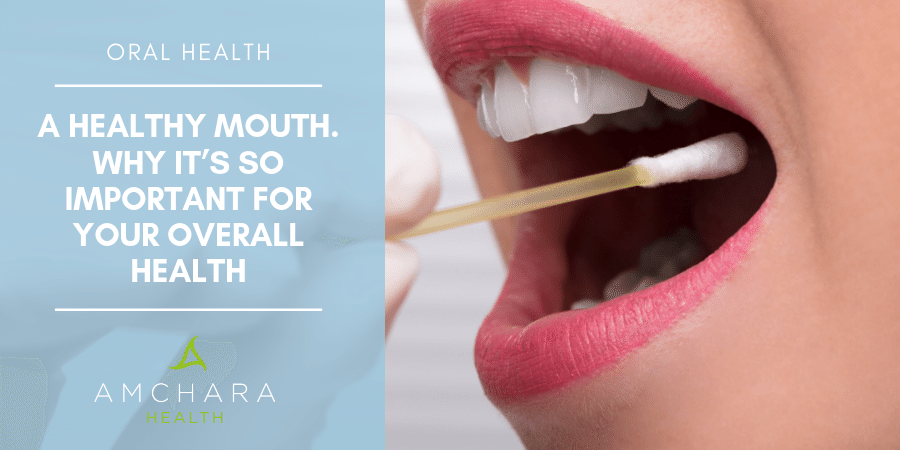Topics Covered in this article:
We all know a healthy mouth is important to avoid cavities and gum disease.
But did you know the health of your mouth can have a significant impact on the health of the rest of your body?
The Bacteria in Your Mouth
The population of bacteria living in our digestive system is well known for its beneficial health effects, but many people don’t realise the mouth is also teeming with bacteria.
There are around 700 species of bacteria naturally found in the mouth.
They’re there for good reason, as they protect us from disease-causing bacteria we may take in with our food.
Certain types of these pathogenic bacteria reside in dental plaque which can build up on teeth and gums if we don’t regularly brush and floss.
Over time this causes gum disease and tooth decay.
These bacteria stimulate the immune system and produce inflammatory molecules which can affect not only the mouth but the entire body.
Because your mouth is the access point to your digestive and respiratory tracts, the bacteria themselves can easily access the bloodstream, especially if the gums are liable to bleed.
They can then enter the general circulation and be carried to any number of locations in the body.
How Unfriendly Oral Bacteria Can Affect Your Health
Pathogenic bacteria from our mouths have been linked to a number of diseases.
-
Cardiovascular Disease
People with gum disease have two to three times the risk of a heart attack or stroke.
Endocarditis is a condition in which the heart valves or the inner lining of the heart itself become infected by bacteria.
In some cases, these have been found to be the same bacteria which cause gum disease.
One bacteria which plays a role in gum disease belongs to the family called Bacteroidetes, a family of bacteria which under normal circumstances live in a symbiotic relationship with us, causing us no harm (1).
However, if they’re allowed to dominate or enter the bloodstream, they can cause problems such as infections.
Presence of Bacteroidetes in the mouth is connected with increased risk of heart disease (2).
Once in the bloodstream, the bacteria seem to adhere to blood platelets, causing them to clump together.
It’s thought this is a mechanism the bacteria use to protect themselves, shielding them from the immune system.
Once the bacteria are hidden in this way they can become inaccessible to antibiotics.
This clumping can cause the formation of a blood clot and eventually a heart attack.
Other research has found the build-up of plaque in our arteries may be closely connected with oral and digestive bacteria.
This type of plaque is different to that found in our mouths, but gum disease and atherosclerosis are often found together.
In one study, researchers analysed arterial deposits and discovered fats within them which were of bacterial, not animal origin (3) – in other words, they had not come from food eaten by the person.
The fats were identified as coming from Bacteroidetes bacteria.
Scientists hypothesise these fats could trigger the immune system, sparking inflammation, as they’re not usually encountered in the bloodstream.
-
Diabetes
Diabetes is a major risk factor for a serious type of gum disease called periodontal disease.
However, it seems the reverse may also be true.
Research has shown treating gum disease improved blood sugar control in Type 2 diabetes (4).
It’s thought inflammation brought about by the periodontal disease may impair the action of insulin.
-
Alzheimer’s Disease
Research discovered a link between gum disease and Alzheimer’s disease, after looking at people over a 20 year period.
It’s thought gum inflammation may contribute to brain inflammation, neurodegeneration and eventually Alzheimer’s disease (5).
Other research has found a specific type of bacteria connected with gum disease in the brains of people suffering from Alzheimer’s which was not present in people without Alzheimer’s (6).
-
Rheumatoid Arthritis
Scientists have found a link between the quantity of teeth lost through periodontal disease and incidence of rheumatoid arthritis.
People with less teeth suffered from more severe arthritis
The joints affected in rheumatoid arthritis and the gums in the case of periodontal disease share similarities in the levels and types of pro-inflammatory molecules.
In fact, sufferers of rheumatoid arthritis improve better if they concurrently receive dental treatment for their periodontal disease (7).
-
Obesity
Interestingly, our oral bacteria could also be linked to our weight.
Researchers who examined the bacteria in saliva samples from obese and normal weight volunteers found certain bacterial species usually found in the mouth were present in higher concentrations in the overweight people.
What’s more, overweight subjects could be accurately predicted by identifying one specific bacteria which was present in 98% of the samples.
It’s not yet clear what role the bacteria play in weight management.
Top Tips to Support a Healthy Mouth
- Avoid antibacterial mouthwashes which kill off bacteria indiscriminately, both good and bad.
- Brush and floss daily, using a natural toothpaste.
- Limit sugar and alcohol, and avoid smoking, which can all upset the bacterial balance in the mouth.
- Concentrate on whole foods with plenty of natural fibre.
- Oil pulling, using coconut oil, has been found to reduce harmful bacteria in the mouth. Swish a dessertspoon of coconut oil around in your mouth for 10-15 minutes, then spit and rinse.
- Low vitamin C levels are associated with gum disease.
Takeaway
At Amchara we believe no one part of the body functions in isolation.
If you would like to explore how your oral health may be affecting your overall health, a consultation with an Amchara Personalised Health practitioner may help.
All aspects of your health history, lifestyle and nutritional status will be considered to formulate your own personalised programme to optimise your health through natural means.
Did you find this article useful?
We are dedicated to providing insightful information on key aspects of health – all orientated towards the personalised health approach.
Do you have any suggestions to support a healthy mouth?
We’d love to hear your thoughts.
READ THIS NEXT:




